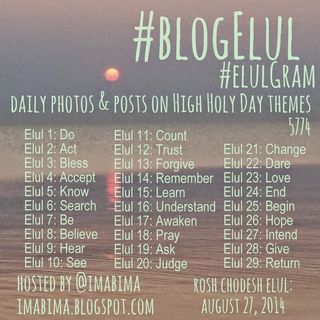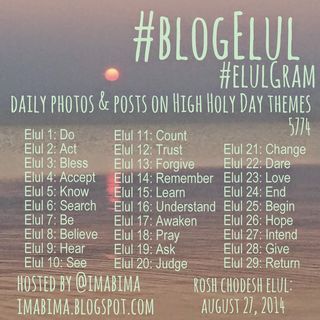Rachel Barenblat's Blog, page 149
September 4, 2014
A poem for #blogElul 9: Hear
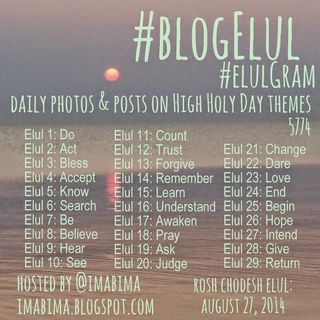 HEAR (ELUL 9)
HEAR (ELUL 9)
The sound that means
change is coming.
The shout of triumph.
The broken plea.
The cry of the heart
cracked open at last.
The rise and fall
of every breath.
The future I haven't lived
knocking at the door.
Tradition teaches that we should hear the shofar every day during Elul as a spiritual wake-up call. The three customary shofar calls are often compared to human sounds of triumph and brokenness. What is the sound which would perk up your ears, speed your heart, wake you to previously-unimagined new possibilities?
I'm participating again this year in #blogElul, an internet-wide carnival of themed posts aimed at waking the heart and soul before the Days of Awe. (Organized by Ima Bima.) You can read last year's and this year's #blogElul posts via the Elul tag; last year's posts are also available, lightly revised, in the print chapbook Elul Reflections.
September 3, 2014
A poem for #blogElul 8: Believe
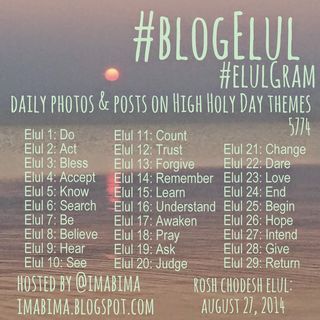 BELIEVE (8 ELUL)
BELIEVE (8 ELUL)
That I am more
than the stories I tell.
That some core of self
remains
though old photos
are no longer mirrors.
That the good
I've tried to do
matters.
That you see me.
That I will find mercy
in your eyes.
I'm participating again this year in #blogElul, an internet-wide carnival of themed posts aimed at waking the heart and soul before the Days of Awe. (Organized by Ima Bima.) You can read last year's and this year's #blogElul posts via the Elul tag; last year's posts are also available, lightly revised, in the print chapbook Elul Reflections.
September 2, 2014
New beginnings, Doctor Who, and teshuvah
Last spring, just before Shavuot, I brought two classical midrash about the giving of the Torah at Sinai to my Hebrew school class, and one of my students made some fannish connections.
Rabbi Yochanan said: When God’s voice came forth at Mount Sinai, it divided itself into seventy human languages, so that the whole world might understand it. All at Mount Sinai, young and old, women, children and infants heard the voice of God according to their ability to understand. Moses, too, understood only according to his capacity, as it is said (Ex. 19:19), “Moses spoke, and God answered him with a voice.” With a voice that Moses could hear. (Shemot Rabbah 5:9)
I brought this midrash to my class, and one of my bar mitzvah students -- a big fan of the television show Doctor Who -- raised his hand and said, "It's like the TARDIS was there, translating!" I knew exactly what he meant.
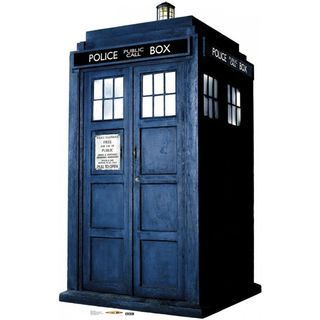 With some prompting he explained to the class that the TARDIS is a time machine. It appears to be an iconic blue police box, though it is famously "bigger on the inside." And it contains a translation circuit which ensures that no matter where or when its inhabitants travel, everyone can be understood. I told him I thought that drawing an analogy to the TARDIS was an interesting way to think about the teaching that everyone heard Torah in a language they could understand. The tradition also teaches that "Torah has 70 faces; turn it and turn it, for everything is in it." Arguably the Torah too is "bigger on the inside" -- always containing more than we imagined.
With some prompting he explained to the class that the TARDIS is a time machine. It appears to be an iconic blue police box, though it is famously "bigger on the inside." And it contains a translation circuit which ensures that no matter where or when its inhabitants travel, everyone can be understood. I told him I thought that drawing an analogy to the TARDIS was an interesting way to think about the teaching that everyone heard Torah in a language they could understand. The tradition also teaches that "Torah has 70 faces; turn it and turn it, for everything is in it." Arguably the Torah too is "bigger on the inside" -- always containing more than we imagined.
Then we moved to the second midrash I had brought:
Because the Holy One appeared to Israel at the Red Sea as a mighty man waging war, and appeared to them at Sinai as a teacher who teaches the day’s lesson and then again and again goes over with his pupils what they have been taught, and appeared to them in the days of Daniel as an elder teaching Torah, and in the days of Solomon appeared to them as a young man, the Holy One said to Israel: Come to no false conclusions because you see Me in many guises, for I am God who was with you at the Red Sea and I am God who is with you at Sinai: I am Adonai your God.
The fact is, R. Hiyya bar Abba said, that God appeared to them in a guise appropriate to each and every place and time. At the Red Sea God appeared to them as a mighty man waging their wars, at Sinai God appeared to them as a teacher, as one who stands upright in awe when teaching Torah; in the days of Daniel, God appeared to them as an elder teaching Torah, for the Torah is at its best when it comes from the mouths of old men; in the days of Solomon God appeared to them as a young man in keeping with the youthful spirit of Solomon’s generation. At Sinai, then, when God said, I am Adonai Your God, appropriately God appeared to them as a teacher teaching Torah. (Pesikta de-Rab Kahana 12)
This, too, made my student think of the Doctor, because the Doctor also appears in different guises at different times: young and old, warrior and scholar. He was so enthusiastic about drawing out these lines of inquiry that I promised him that he could speak about this at his bar mitzvah if he were willing to do a bit of extra learning with me, a bargain which he eagerly accepted.
As I worked with him over the summer on his d'var Torah ("word of Torah" -- the spoken-word teaching he would offer at his bar mitzvah which would relate Torah and Jewish tradition to his own life), we talked both about how he understood his Torah portion and its relevance to his life, and about how these midrash evoke his favorite pop culture hero. (Of course we also talked about how Jewish understandings of God are different from the Doctor, because that matters too.) When he spoke from the bimah, he spoke about his Torah portion; about his participation in one of our congregation's social action projects; and about how he related Doctor Who to his understanding of what it means to be a Jew.
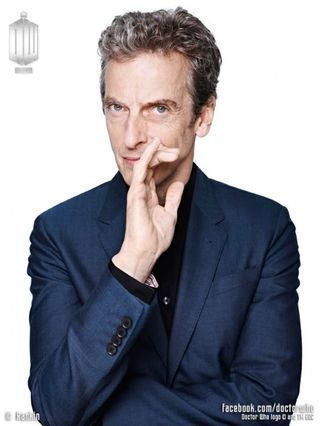 My student's celebration of bar mitzvah dovetailed with the premiere of the new season of Doctor Who. (I'm fairly certain the family chose the date for entirely other reasons, but the calendrical confluence made his d'var Torah that morning extra timely!) On Saturday night after that Shabbat was over, the fantastic Peter Capaldi took the screen as the twelfth regeneration of the Doctor.
My student's celebration of bar mitzvah dovetailed with the premiere of the new season of Doctor Who. (I'm fairly certain the family chose the date for entirely other reasons, but the calendrical confluence made his d'var Torah that morning extra timely!) On Saturday night after that Shabbat was over, the fantastic Peter Capaldi took the screen as the twelfth regeneration of the Doctor.
For Whovians I'm retreading familiar ground, but for those who don't know the show, here's the gist: many actors have played the central role since 1963 when the show began. One of the show's premises is that the central character, the eponymous Doctor, is a member of a race known as Time Lords. (Perhaps a link could be drawn between Time Lords and Torah's reference to the ish iti, the "timely man" or "man of the time" or "timeless man," designated in Leviticus to lead the sacrificial scapegoat into the wilderness.)
Anyway, when a Time Lord's body has reached the end of its life, the person who inhabits it can take on a new form and begin a new incarnation. His appearance will be different, and some of his likes and dislikes, mannerisms and visible personality quirks, will be different; but ultimately he is the same person, with a clear throughline of character which links all of his iterations. Inevitably, the first episode of any new Doctor's run deals with new beginnings.
That theme seemed particularly timely to me when the new series of episodes began, because for Jews this time of year is all about new beginnings. Right now we're in the lunar month of Elul, a time of introspection and self-examination during which we prepare ourselves for the Jewish new year. At this season we are called to engage in an intensive process of teshuvah, repentance or return. The word comes from a root denoting turning-around; it means something like re-orienting ourselves, or re-aligning ourselves in the right direction again. Taking steps to fix our mistakes. Resolving to do better next time.
It's arguable that the beginning of every regeneration, for the Doctor, is an opportunity for teshuvah. The Doctor travels through space and time trying to do good. He inevitably falls short somewhere along the way. And he always gets the chance to start over. Perhaps these are my rabbinic lenses at work, but I've always experienced Doctor Who as a fundamentally Jewish show (even though there's no explicit Jewishness in it) because of how the show's structure centers around the idea of beginning again. Toward the end of the first episode of the new season, the Doctor reflects, "I've made many mistakes. It's about time I did something about that." That's the quintessential move of teshuvah: recognizing that we've missed the mark, resolving to orient ourselves in a new direction, and aiming to do better the next time the opportunity comes along.
Early in the second episode of the new season, he asks his companion Clara, "Am I a good man?" It's clear that he's engaged in a wrestle with his past, and that his sense of self rests, in part, on the answer to that question. We viewers might do well to ask ourselves -- and perhaps more importantly, our close friends -- the same question. My teacher Reb Zalman (may his memory be a blessing) was insistent that there are aspects of teshuvah which require a partner, a trusted friend to whom one can pose these kinds of questions. How am I doing? Where am I falling short? What is the work I need to do in order to be the person I want to become? What qualities do I want to cultivate, and how should I deal with my own prejudices and flaws? (Clara's answer is also instructive from a Jewish point of view. At the episode's end she tells him that she's doesn't know whether or not he's a good man, but he tries to be, and that's what matters. In Jewish terms, whether or not he misses the mark from time to time is less important than the fact that he's aiming in the right direction.)
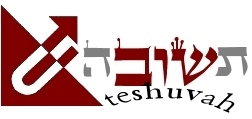 The sage Maimonides (d. 1204) wrote in Hilkhot Teshuvah (Laws of Repentance) that the way one knows whether one has made teshuvah is this: presented with the same opportunity to miss the mark, the same place where one erred before, one instead chooses a different path. The Greek philosopher Heraclitus of Ephesus claimed that one can't step into the same river twice, but Jewish tradition argues otherwise. Over the course of our lives we bring ourselves back to the same issues and challenges time and again. We're always returning to the places where we have made mistakes: in our lives, in our relationships with each other, in our relationships with our planet and with our Source. As paraphrased by Rabbi Alan Lew:
The sage Maimonides (d. 1204) wrote in Hilkhot Teshuvah (Laws of Repentance) that the way one knows whether one has made teshuvah is this: presented with the same opportunity to miss the mark, the same place where one erred before, one instead chooses a different path. The Greek philosopher Heraclitus of Ephesus claimed that one can't step into the same river twice, but Jewish tradition argues otherwise. Over the course of our lives we bring ourselves back to the same issues and challenges time and again. We're always returning to the places where we have made mistakes: in our lives, in our relationships with each other, in our relationships with our planet and with our Source. As paraphrased by Rabbi Alan Lew:
The unresolved elements of our lives -- the unconscious patterns, the conflicts and problems that seem to arise no matter where we go or with whom we find ourselves -- continue to pull us into the same moral and spiritual circumstances over and over again until we figure out how to resolve them.
There are always opportunities to make a different choice the second (or third, or fifth, or twelfth) time around.
Unlike the Doctor, we don't have the benefit of being able to literally regenerate. (Though there are plenty of Jewish traditions about gilgul ha-nefesh, the transmigration or reincarnation of souls; I spoke a bit about that in my Kol Nidre sermon a few years ago.) And we don't have access to otherworldly time machines which would allow us to literally return to the places where we missed the mark. But all of us can take the existential step of acknowledging that we've missed the mark and that we want to be better versions of ourselves in the year to come. All of us have the opportunity to start anew, every day of our lives. (For more teachings on that, see my 2006 post Reb Zalman on teshuvah, which draws on his booklet A Guide For Starting Your New Incarnation, available as a download from the ALEPH Canada store.)
The process of teshuvah is some of the most important spiritual work there is. Jewish tradition offers opportunities for nightly teshuvah, weekly teshuvah (before Shabbat), monthly teshuvah (before new moon), and this big journey of annual teshuvah during the lead-up to the Days of Awe. The process of teshuvah calls us to ask: who do you want to be? Looking back on who you've been, where have you lived up to your hopes and where have you fallen short? Who do you need to forgive in order to move on, and from whom do you need to ask forgiveness? Recognizing that you can start over right now, how do you want to make that happen and begin again?
I doubt highly that the folks at the BBC had any notion, in 1963 when Doctor Who began, that they were creating a text which might evoke the journey of teshuvah for Jewish viewers for half a century to come. But I believe that it's our task as readers of any text (whether written or televisual) to find our own meaning in it, and that the finding of meaning is an essentially creative act. In coming to our own interpretations of what we're given, we become in a way co-creators of the text we're reading. To use another midrashic metaphor, we're contributing to the white fire which surrounds the black fire of the text. The pshat (simple / surface meaning) of these early episodes of the new series of Doctor Who suggests that the Doctor is doing some self-examination. As viewers, we would do well to follow his example and plunge into our own process of teshuvah.
Some may scoff at the notion of finding this kind of lofty life lesson in a show which is as endearingly over-the-top as Doctor Who. But I say: find teachers of teshuvah wherever you can. Your new incarnation could begin right this minute. The new year is just around the corner. Opportunities for teshuvah abound. What are you waiting for? Who do you want to become?
For more on the confluence of theology and Doctor Who, see Where fandom and religion coincide. If the idea of reading pop culture texts midrashically is interesting to you, stay tuned -- the next issue of Transformative Works & Cultures is going to feature an essay of mine on that very subject, and they have an open access policy, so the essay will be available for all to read starting on September 15. And for more on teshuvah, try the teshuvah category.
A poem for #blogElul 7: Be
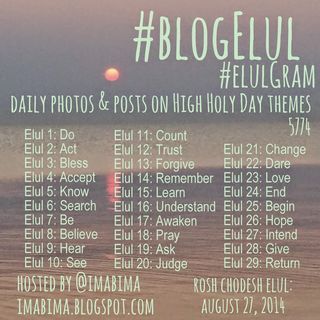 BE (7 ELUL)
BE (7 ELUL)
Time to decide
who I want
to be
this time
around the wheel.
Look:
goldenrod sparks
and fizzes
like gold dust
by the roadside.
A new year
a new morning
a new lifetime
just around
the bend.
Will I be
playful today
or severe?
What in me
endures
no matter how
I dress
what stays
through all
of my changes?
I'm participating again this year in #blogElul, an internet-wide carnival of themed posts aimed at waking the heart and soul before the Days of Awe. (Organized by Ima Bima.) You can read last year's and this year's #blogElul posts via the Elul tag; last year's posts are also available, lightly revised, in the print chapbook Elul Reflections.
September 1, 2014
#blogElul 6: Search
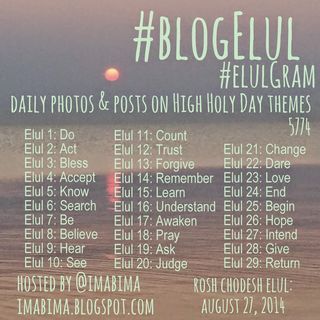 SEARCH (6 ELUL)
SEARCH (6 ELUL)
I want you to see me
even when I'm unlovely.
Lost on familiar roads.
Who's in the mirror?
My feet are confused
but I know I don't want
to be a mechanical rabbit
on a greyhound track.
Is it safe to show
my true colors, flash
my most hidden heart?
Will you turn me away?
What mattered more:
the wrong turn
or the change in course?
What am I searching for?
I'm participating again this year in #blogElul, an internet-wide carnival of themed posts aimed at waking the heart and soul before the Days of Awe. (Organized by Ima Bima.) You can read last year's and this year's #blogElul posts via the Elul tag; last year's posts are also available, lightly revised, in the print chapbook Elul Reflections.
August 31, 2014
#blogElul 5: Know
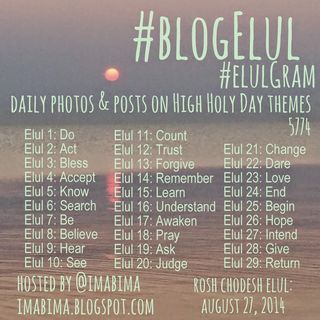 KNOW (ELUL 5)
KNOW (ELUL 5)
It's time to wake up.
The shofar is sounding.
This is real:
open your eyes.
The shofar is sounding
a call to remember.
Open your eyes.
Who have you become?
A call to remember
you could have been kinder.
Who have you become
since last we gathered?
You could have been kinder.
Don't take it too hard:
since last we gathered
no one's been perfect.
Don't take it too hard.
You're loved anyway.
No one's been perfect.
The leaves are turning.
You're loved anyway.
The moon waxes brighter.
The leaves are turning.
Where are your loose ends?
The moon waxes brighter
as the work grows more urgent.
Where are your loose ends?
We all have the same heart.
As the work grows more urgent
where is your mind torn?
We all have the same heart.
God's door is open.
Where is your mind torn?
This is real.
God's door is open.
It's time to wake up.
Many of the ideas in this poem are drawn from Rabbi Alan Lew's This Is Real And You Are Completely Unprepared: The Days of Awe as a Journey of Transformation, which I slowly re-read every year at this season.
I'm participating again this year in #blogElul, an internet-wide carnival of themed posts aimed at waking the heart and soul before the Days of Awe. (Organized by Ima Bima.) You can read last year's and this year's #blogElul posts via the Elul tag; last year's posts are also available, lightly revised, in the print chapbook Elul Reflections.
August 29, 2014
#blogElul 3: Bless
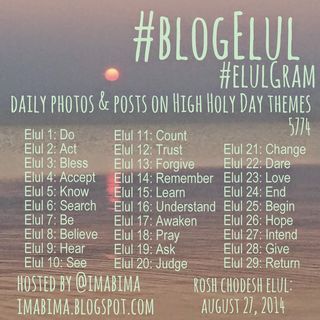 BLESS (ELUL 3)
BLESS (ELUL 3)
What do we bless
I ask and you point:
first flames then goblets
then bread braided smooth
my lips brush your forehead
d'var acher another view:
Blessed is the One
who opens doors into holiness
and implants meristem cells
into grape vines coiling
Blessed is potential
curled tight in the kernel
of every grain we mill and bake
bless infinity translated into cosmos
creation's atoms persist in us
"D'var acher" means "another viewpoint" (literally it means either "another word" or "another thing.") It's a common rabbinic way of shifting from one opinion to another.
I'm interested in our common parlance about blessings -- we say that we bless candles, juice, bread, though in truth our blessing formula teaches that we bless God Who makes and sanctifies these.
I'm participating again this year in #blogElul, an internet-wide carnival of themed posts aimed at waking the heart and soul before the Days of Awe. (Organized by Ima Bima.) You can read last year's and this year's #blogElul posts via the Elul tag; last year's posts are also available, lightly revised, in the print chapbook Elul Reflections.
#BlogElul 4: Accept
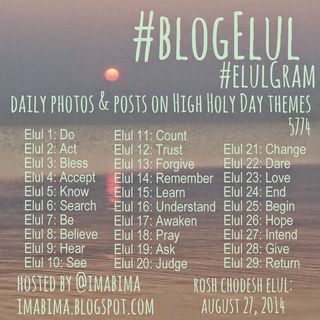 ACCEPT (ELUL 4)
ACCEPT (ELUL 4)
The leaves will turn
then let go.
The days will flicker
like candle stubs.
The woman tethered
to a toxic drip
will get better
or she won't.
The child in me shouts
it isn't fair --
as though I could change
God's mind, rewind
the fallen leaves
to spring chartreuse.
The process of writing today's poem began with the idea that where I get myself into trouble (where I suspect we all get ourselves into trouble) is wanting things to be different than they are. Some things are changeable, of course. But others aren't. Time, for instance, flows in only one direction.
Accepting what is can be a powerful spiritual practice. What changes in me if I make the conscious choice to accept instead of to fight? How do I gauge when I should be working on accepting what is, and when I should be working on changing the world? Good questions for this fourth day of Elul.
I'm participating again this year in #blogElul, an internet-wide carnival of themed posts aimed at waking the heart and soul before the Days of Awe. (Organized by Ima Bima.) You can read last year's and this year's #blogElul posts via the Elul tag; last year's posts are also available, lightly revised, in the print chapbook Elul Reflections.
August 28, 2014
#blogElul 2: Act
Remember standing in the wings
chest full of butterflies
listening for the cue
to step forward and speak?
You could look at scuffed wood
and remember the masking tape
that told you where to stand.
And when you said your piece
you knew the response
before the words rang out.
Today there is no such luxury.
Improvise your lines.
Work with whatever emotions
well up behind your eyes.
Comedy may veer to tragedy
and back without warning.
The curtain never goes down.
The reviewer is always watching.
Good news: I hear she's inclined
toward mercy if you keep it real.
I'm participating again this year in #blogElul, an internet-wide carnival of themed posts aimed at waking the heart and soul before the Days of Awe. (Organized by Ima Bima.) You can read last year's and this year's #blogElul posts via the Elul tag; last year's posts are also available, lightly revised, in the print chapbook Elul Reflections.
August 27, 2014
#blogElul 1: Do
I didn't have perfect faith.
I didn't trust the world
with my eggshell heart.
I didn't notice
each miraculous instant.
I cut sandwiches
into small triangles. I read
about the little blue truck
and the friendly tractor.
I sang every night.
I tried to say thank you
even if the food were already
in my mouth, even if the day
were already underway
by the time I blessed the coffee.
What words did I inscribe
in the book of memory?
I wanted to write kindness
more often than I scrawled
impatience. I wanted
to practice compassion
when my son woke me
when traffic slowed me
when strangers smeared
my inbox with anger.
The camera is always rolling.
Play back the year
snacking on popcorn
with the Kadosh Baruch Hu,
see what the record shows.
"Kadosh Baruch Hu" is Hebrew for "The Holy One of Blessing," e.g. God.
I'm participating again this year in #blogElul, an internet-wide carnival of themed posts aimed at waking the heart and soul before the Days of Awe. (Organized by Ima Bima.) You can read last year's and this year's #blogElul posts via the Elul tag; last year's posts are also available, lightly revised, in the print chapbook Elul Reflections.
Rachel Barenblat's Blog
- Rachel Barenblat's profile
- 6 followers


